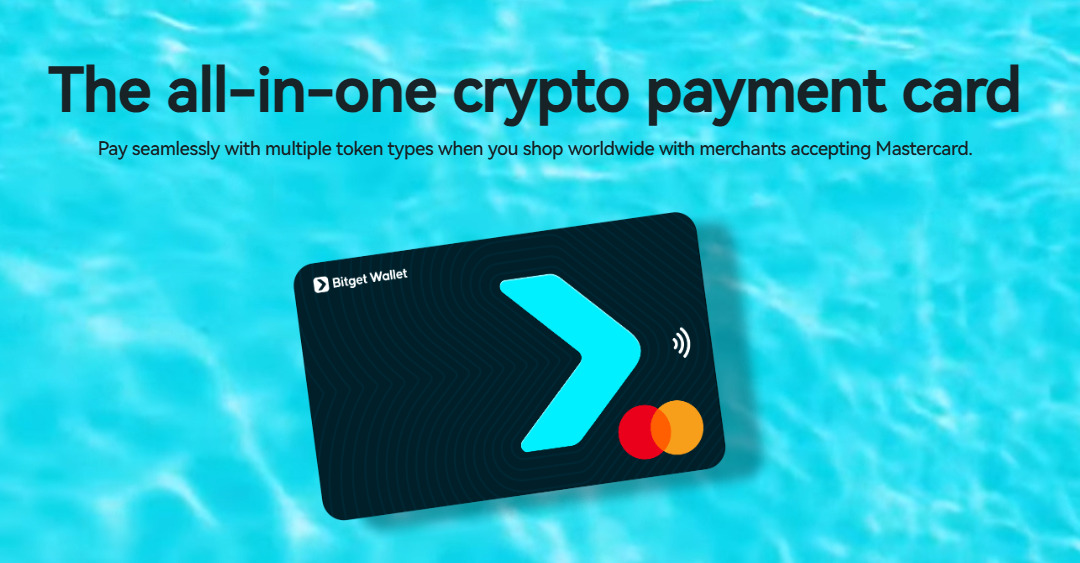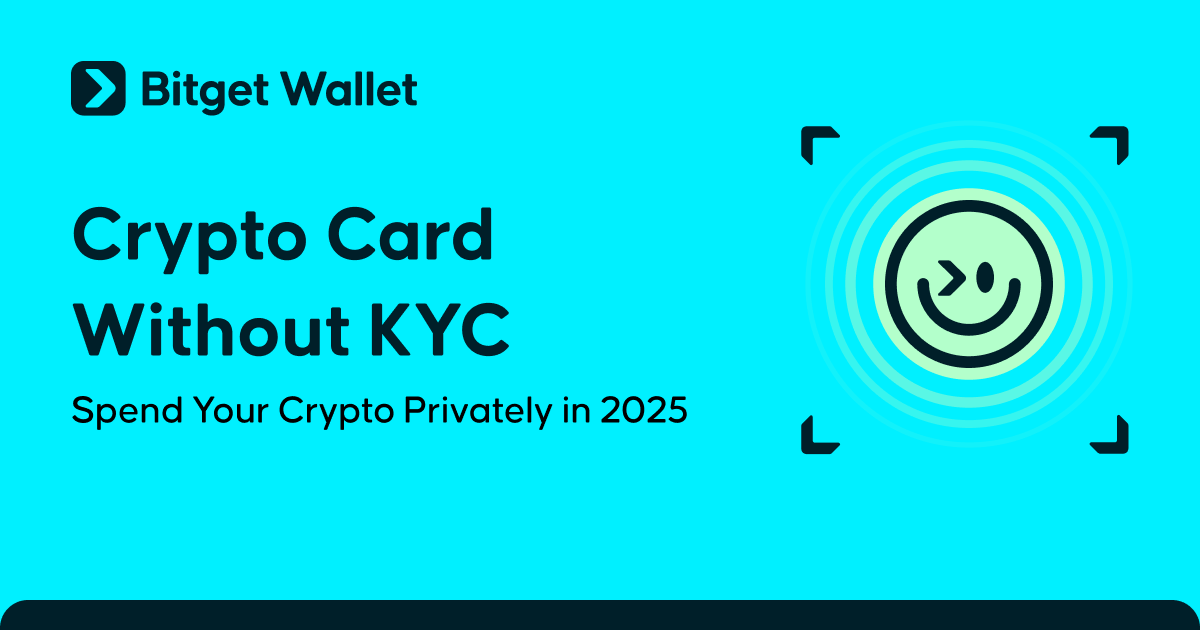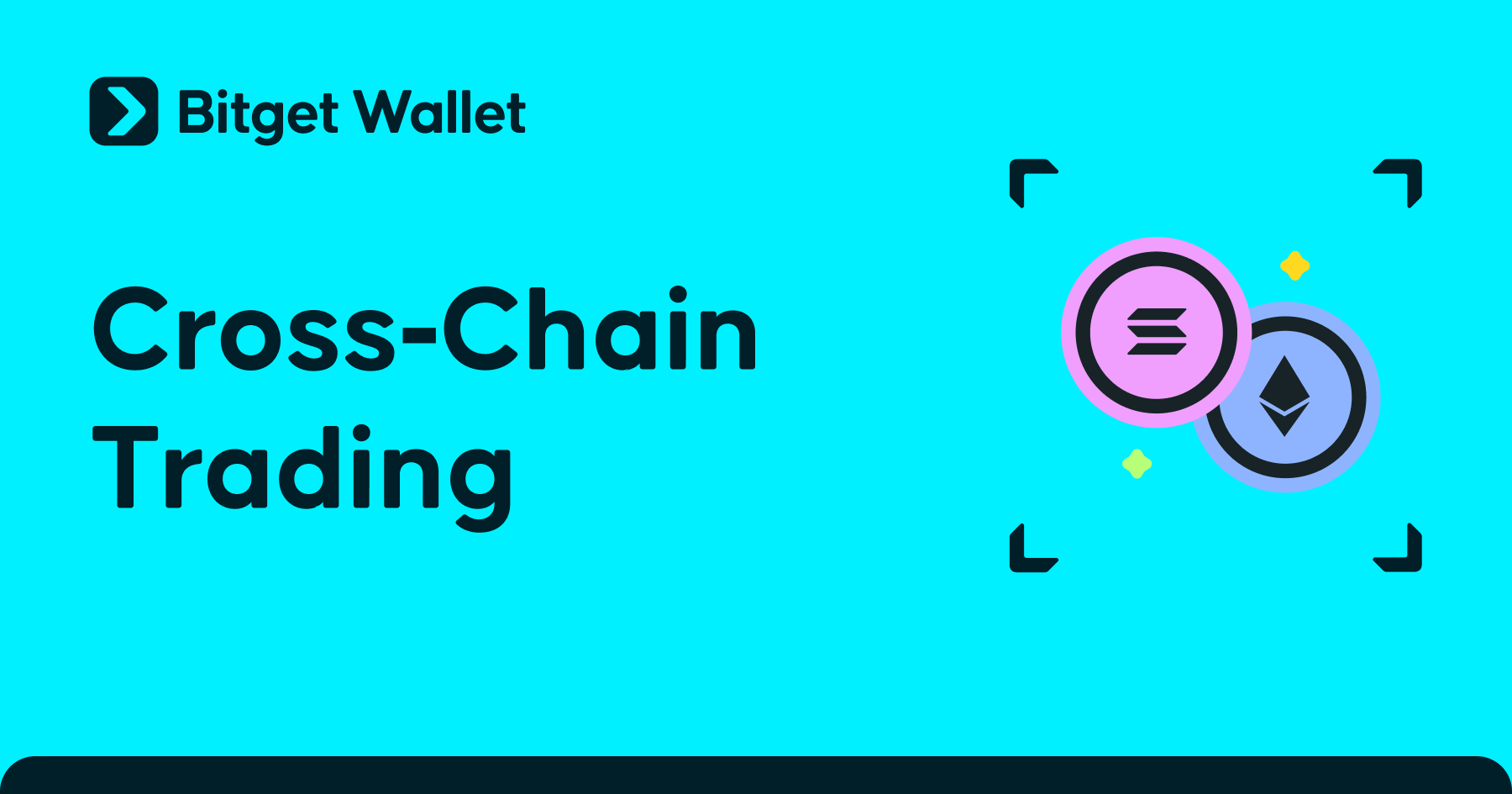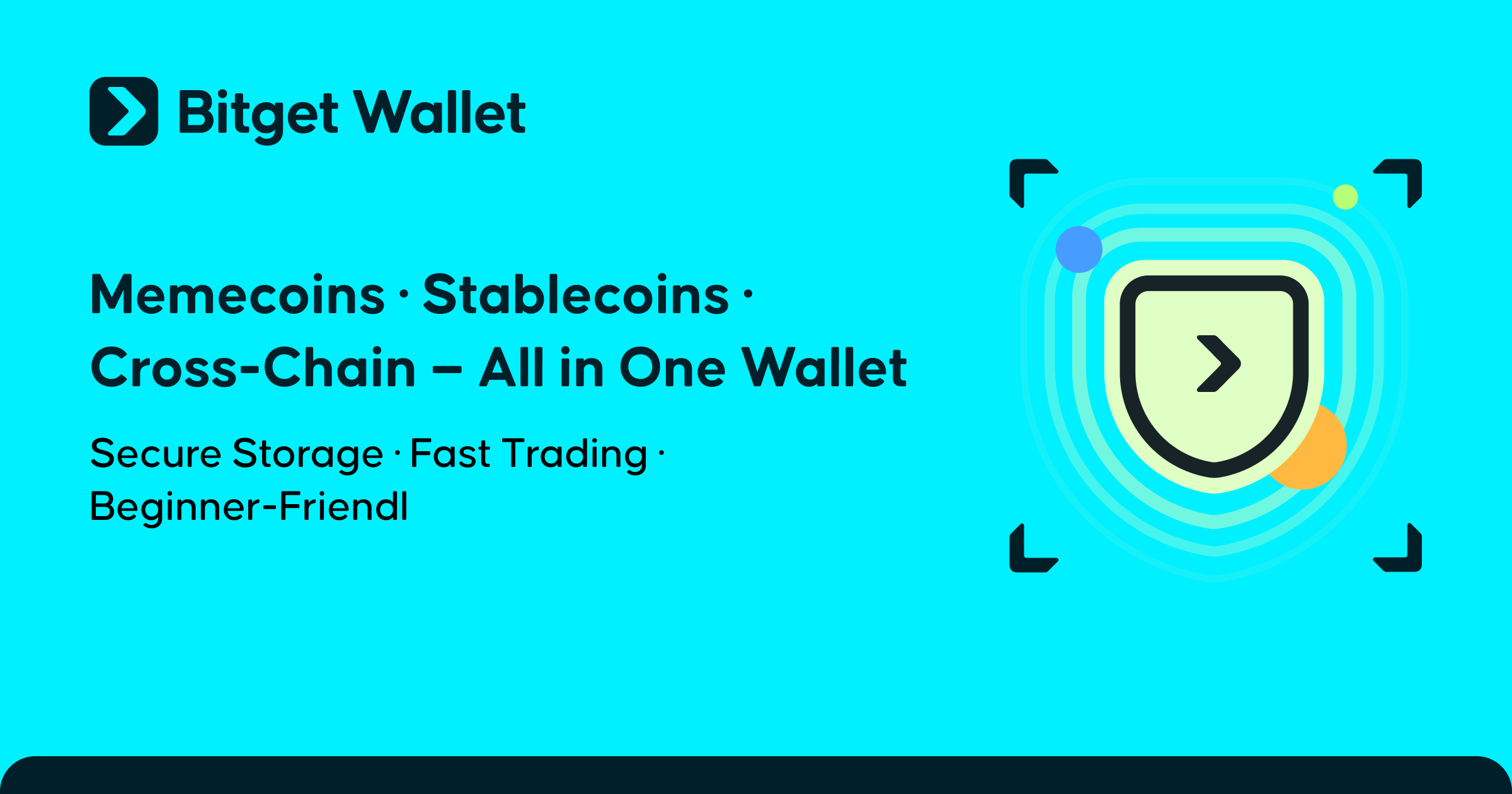Crypto Card Without KYC: Spend Your Crypto Privately in 2025
Crypto Card Without KYC is quickly gaining popularity as more Web3 users demand financial privacy in an increasingly surveilled world. As governments tighten KYC (Know Your Customer) regulations, many crypto users feel cornered—unable to spend their own assets freely without revealing personal information.
The desire to spend crypto like cash clashes with centralized systems requiring identity verification at every turn. That’s why non-KYC crypto card solutions—despite their risks—are becoming more appealing than ever in 2025.
In this guide, we’ll explore what a crypto card without KYC is, how it works, its pros and cons and how Bitget Wallet is bridging the gap with its fast-KYC card offering 5% cashback for early adopters.
What Is a Crypto Card Without KYC?
Crypto Card Without KYC refers to a debit or credit-style card that allows users to spend cryptocurrency in the real world—without undergoing traditional identity verification processes like submitting an ID or doing a facial scan.
These cards typically function as crypto debit cards, funded directly by the user’s crypto wallet. Unlike crypto credit cards, which often involve borrowing against crypto collateral or require a bank relationship, no-KYC cards work independently of banks or centralized financial institutions.
How These Cards Usually Work?
No-KYC crypto cards rely on blockchain rails and decentralized payment gateways to facilitate real-world spending. Here's how they typically operate:
- On-chain funding: Users load the card using a blockchain transaction—no fiat bank account required.
- Peer-to-peer mechanics: Some solutions function through P2P settlements or prepaid voucher systems.
- No centralized control: Since these cards avoid bank integration, they typically escape traditional compliance frameworks.
- Instant issuance: No verification means users can get up and running in minutes.
However, due to compliance pressure, many platforms enforce spending limits or geographic restrictions to stay under regulatory radars. As a result, these tools prioritize accessibility and privacy over full functionality.
🔥 Brazil Exclusive: Get 20% Cashback + 5 USDC Rewards with Bitget Wallet Card! 🔥
Make your first purchases smarter with the Bitget Wallet Card, now available exclusively for users in Brazil! Enjoy 20% cashback—capped at 10 USDC per user—and get your rewards in USDC at the end of the campaign.
✨ Campaign Highlights (Brazil Only):
- 🇧🇷 20% Cashback on eligible spending (max 10 USDC)
- Rewards distributed in USDC after the campaign
- Refer friends in Brazil & earn 5 USDC for each successful activation
- Friend must complete KYC + activate their Bitget Wallet Card
- Referral rewards paid out weekly
CTA: Brazil Users – Get Your Bitget Wallet Card Today and Earn 10 USDC!
Benefits of Using a Crypto Card Without KYC
Crypto Card Without KYC solutions offer a unique combination of security and convenience, highly appreciated by the Web3 community. Although not for everyone, this product has the following 4 outstanding advantages:
1. Privacy
- No need to upload ID/CCCD or personal selfie to the system.
- Minimize the risk of information disclosure when a data leak occurs.
- Full control over personal identification information.
2. Anonymity
- No need to go through the identity verification process (KYC).
- Prevent the risk of identity theft or financial tracking.
- Especially valuable in areas with strict banking supervision systems.
3. Speed
- Instant card activation - no waiting for manual approval.
- Skip the document verification queue.
- Cryptocurrency deposits/withdrawals take place in minutes.
4. Convenient
- Immediately available after activation at any payment acceptance point.
- Ideal for emergency expenses or unexpected purchases.
- Ideal for frequent travel or travel due to its flexibility.
What Are the Risks and Limitations of Using a No KYC Crypto Card?
While Crypto Card Without KYC options are fast and private, they come with important trade-offs. It’s critical to understand these risks before choosing a no-KYC solution.
1. No Legal Protection
- If your funds are hacked, stolen, or frozen, there may be no legal recourse.
- Most no-KYC platforms operate outside regulated financial frameworks.
- There’s often no support team or insurance to help you recover losses.
2. Regulatory Restrictions
- Some no-KYC cards may not work in certain countries, especially those with strict AML/KYC laws.
- This limits usability when traveling or living in heavily regulated regions.
3. Low Spending Limits
- Many no-KYC cards enforce daily, monthly, or lifetime spending caps to remain compliant.
- These limits are often far lower than what fully verified cards offer.
4. Risk of Sudden KYC Enforcement
- Banks or payment partners may freeze your card or suddenly demand KYC.
- This typically happens during suspicious transactions or large spending spikes.
- If you can’t complete KYC, you may lose access to your funds.
Where Can You Get a Crypto Card Without KYC?
Crypto cards without KYC are not easy to find, but certain alternative methods still allow you to access crypto spending cards without strict identity verification. However, always be cautious with platforms that lack transparency around their KYC processes.
Anonymous Transaction Options (Non-Custodial & Non-CEX)
These services let you swap crypto assets or sign up for crypto card products without directly verifying your identity—especially for low-value transactions. Some are instant swap apps or liquidity aggregators.
- No permanent account creation required.
- No verification needed if under a specific value threshold (usually $100–$500).
- However, intermediaries or card issuers may still trigger KYC checks during payment or shipping steps.
Example: A user connects a non-custodial wallet and uses a quick swap tool to register for a virtual crypto card without creating an account.
Peer-to-Peer (P2P) or Community Transactions
This involves direct exchanges between individuals—where you might purchase a card or related service from a seller who doesn’t require KYC.
- No centralized intermediary.
- Level of anonymity depends on the agreement between buyer and seller.
- Higher risk: potential scams, poor service quality, or inactive cards.
Example: Someone resells an unactivated crypto card, and the buyer pays in USDT directly through a non-custodial wallet.
Risks of Using a No-KYC Crypto Card
- Sudden policy shifts: Platforms that initially skip KYC may change due to regulatory pressure.
- Data exposure: Even without KYC, your wallet address, browser, or payment partners may still be traceable.
- Frozen assets: Some services may block transactions or access rights without clear justification.
How Bitget Wallet Card’s “No-KYC” Program Works
The Bitget Wallet Card stands out as a breakthrough option. It blends full user asset control with a hyper-simplified verification process—unlocking crypto usage like cash, with no hurdles.
With just one basic identity check (ID + facial recognition), you can access a decentralized and global spending ecosystem.

Key Benefits of the Bitget Wallet Card
- Verify in 3 Minutes: Just an ID and a face scan—no fuss.
- No Preload Required: Onchain swaps directly from your wallet—no top-up needed.
- Instant Use: Integrates with Apple Pay and Google Pay.
- 5% Cashback: Earn up to 10 USDT/month in BGB for daily spending (ends Sept 30, 2025).
- Pan-European Usage: Covers all EU countries plus the UK.
- Global Acceptance: Mastercard-compatible, usable at millions of merchants worldwide.
- Non-Custodial, Pure Web3: Users retain full control of assets in their Bitget Wallet.
Promotion Program Details
Bitget Wallet is currently offering a special promotion for users who prioritize privacy but still want global card utility:
| Item | Details |
| Duration | June 25 – Sept 30, 2025 |
| Eligibility | First 2,000 users who complete light KYC |
| Cashback | 5% in BGB tokens |
| Reward Cap | Up to 10 USDT/month |
| Spending Limit for Rewards | Up to 200 USD/month |
| Reward Distribution | On the 3rd of each month after meeting the criteria |
🎁 Note: Cashback applies only to real consumer spending—not valid for peer-to-peer transfers or third-party top-ups.
Bitget Wallet’s promotion isn’t just a short-term perk—it’s a gateway for Web3 users to experience a next-generation crypto card that protects privacy while remaining globally compliant and usable.
What’s the Main Difference Between No-KYC and Traditional Crypto Cards?
Crypto Card Without KYC options focus on user privacy and fast onboarding. In contrast, traditional crypto cards prioritize regulatory compliance, higher spending limits, and global reach. Here’s a quick breakdown:
| Feature | No-KYC Card | Traditional KYC Crypto Card |
| Privacy | High | Low to Medium |
| Spending Limits | Low | High |
| Legality | Risky in some regions | Fully Regulated |
| Onboarding Time | Instant or very fast | Slower (KYC approval needed) |
| Coverage | Limited, region-based | Global acceptance |
Using a crypto card without KYC gives you greater anonymity, but comes with serious tradeoffs: lower spending power, limited support, and legal gray areas. Traditional cards may feel invasive, but they offer stability, global coverage, and stronger consumer protection.
Do You Still Have to Pay Taxes If You Use a No-KYC Crypto Card?
Absolutely—no KYC doesn’t mean no tax liability. Even if your identity isn’t verified on the platform:
- Blockchain transactions are public. Authorities can trace wallet addresses through analytics tools, especially if you’ve interacted with any KYC platform (exchanges, bridges, etc.).
- Cash-out events are traceable. If you spend crypto at a merchant or convert it to fiat through any channel, it could create a taxable event.
- Non-compliance carries consequences. Tax evasion, even with no-KYC tools, can result in fines or legal issues—especially in stricter jurisdictions like the U.S., UK, or EU.
Tip: Use privacy-respecting wallets, but always track your gains and losses to remain compliant with local tax laws.
Conclusion
Crypto cards without KYC open a door to freedom – where privacy is respected, speed is paramount, and you have complete control over your Web3 assets. It is a great choice for those who value independence and speed of start-up. But freedom comes at a price. Sometimes you have to trade it for spending limits, potential uncertainties, or even legal gray areas depending on where you live. That is a significant downside that you need to consider.
So if you are looking for a more balanced path – keeping optimal convenience while ensuring legal safety – Bitget Wallet Card is the worthy answer. With just a simple KYC procedure, you have unlocked a whole world: swap assets right on the chain, pay globally with Mastercard, and enjoy an attractive 5% cashback offer. All without giving up control of your assets.
Choose your smart card, choose according to your own needs. Because whether you prioritize absolute privacy, or need a harmonious combination of convenience and compliance, there is a suitable key to open the door to your financial future. Listen to yourself and choose wisely!
Spend stablecoins anywhere – beginner-friendly Bitget Wallet Card is here.
Sign up Bitget Wallet now - grab your $2 bonus!
FAQs
1. What is a no-KYC crypto card?
A no-KYC crypto card is a payment card that lets you spend cryptocurrencies without completing traditional identity verification (Know Your Customer). Unlike regular cards issued by centralized exchanges, these cards are often provided through decentralized platforms or P2P services and prioritize user privacy—though they typically come with lower limits and higher risks.
2. Are crypto transactions using a no-KYC card completely anonymous?
Not fully. While no ID is submitted during signup, blockchain transactions are transparent and traceable. Linking your wallet to any KYC platform or merchant can expose your identity.
3. Is Bitget Wallet Card really a no-KYC card?
Not exactly. Bitget Wallet Card uses minimal KYC—just a fast ID scan and facial check—but offers a Web3-native, non-custodial experience and is much more privacy-preserving than traditional exchange cards.
Risk Disclosure
Please be aware that cryptocurrency trading involves high market risk. Bitget Wallet is not responsible for any trading losses incurred. Always perform your own research and trade responsibly.
- How to Apply for a Crypto Mastercard2026-01-05 | 5 mins
- How to Apply for a Crypto Visa Card and Start Spending Crypto Worldwide2026-01-02 | 5 mins
- How to Top Up Your Crypto Debit Card with USDT2025-12-29 | 5mins


















